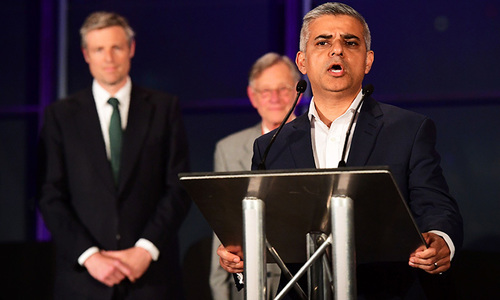In Pakistan, the only election in Britain’s recent polls that mattered was the mayoral race in London, and Sadiq Khan’s victory over his Conservative Party rival, Zac Goldsmith, was the biggest story. But in fact, literally hundreds of elections took place the same day all across the UK.
Normally, elections for council seats and city governments present voters with an opportunity to focus on local issues and to vent their anger against the sitting government in Westminster. In the process, the opposition often makes gains of hundreds of council seats. However, given the ongoing turmoil in the Labour Party as well as the recent charges of anti-Semitism, many pundits had predicted that the party would actually lose seats. In this event, they suggested that a coup against the recently elected leader, Jeremy Corbyn, could not be ruled out.
However, by hanging on to roughly its previous numbers, Labour was saved from complete humiliation. Nevertheless, by being pushed to third place in Scotland behind the Scottish National Party (SNP) and the Conservatives, Labour has lost its once commanding position in the region where it was born over a century ago.
The SNP, though falling short of an outright majority by a couple of seats, will now begin its third consecutive term in office. Its leader, Nicola Sturgeon, has emerged as probably the most formidable politician in Britain. Her party appeals to Labour’s base of progressive, left-leaning voters as well as to nationalists. The Conservatives are now seen as an alternative for Scots who oppose separation from the UK. And as Labour also rejects calls for independence, it has lost support to the point where it has now been relegated to third place.
However, it will still govern in Wales, although it has lost its outright majority there. The UK Independence Party has achieved a surprising result, winning six seats in the Welsh assembly. So all in all, a dismal result for Labour, although not quite the disaster some had predicted. Khan’s victory in London was the only real bright spot for Labour, and even here, most commentators gave the credit for the historic triumph to the candidate, and not to the party.
Almost all the pundits on TV and the major newspapers suggested that Labour’s poor performance did not bode well for its chances in the next general elections. However, given that these are not due till 2020, one should not read too much into last week’s results. Also, turnout in local council elections tends to be generally low.
Nevertheless, Labour’s failure to make major gains at a time the ruling Conservative Party has made many painful cuts in public sector spending resulting in a sharp reduction in welfare spending suggests that all is not well. The emergence of the hitherto obscure hard-left backbencher, Corbyn, to the party leadership has caused a backlash from centrist grandees who were in the ascendant under Tony Blair and Gordon Brown. This lurch to the left has caused deep rifts within the party that have hit the headlines time and again.
Corbyn is seen as a boon to the Conservatives as his presence appears to ensure that they will win comfortably in 2020, a view shared by many in the Labour Party. The reality is that an extreme left position in today’s Britain is far from the mainstream. Although Corbyn is very popular with young party members who oppose the excesses of capitalism that almost brought the banking system to its knees in 2008, most middle-class Brits seek a moderate path. And to win, Labour will need to reach out beyond its base to independents, something Khan’s victory vindicates.
The quandary for Labour is that as things stand today, it will need a 13 per cent edge over the Conservatives to win the next general elections. The reason is that many constituency boundaries have been redrawn to the ruling party’s advantage. Labour’s other path to power is to form an alliance with the SNP which also has seats in the House of Commons. But the risk for Corbyn is that the SNP is opposed to the presence of the UK’s nuclear submarine base on its soil. In the last election, David Cameron used this line of attack against Labour, saying that a Labour-led coalition with the SNP would weaken the country’s defence.
But in the midst of this doom and gloom for Labour, Khan’s victory in London is something to celebrate. Although Goldsmith tried to capitalise on his rival’s Muslim faith by raising the spectre of extremism, these scurrilous charges were roundly condemned and rejected by Londoners. The fact is that London has a very diverse population, and for most of them, religion is a purely personal matter that has nothing to do with public life. This is why the Tory tactics backfired so badly, and it will be a long time before Goldsmith lives down this shoddy smear campaign.
The son of a Pakistani immigrant who made a living as a bus driver, Khan became a human rights lawyer before being elected from Tooting as a Labour MP. Married to a lawyer, he has smashed many stereotypes on his amazing journey. For instance, he supports gay marriage, and recently attacked Corbyn for not rooting out anti-Semitism from the party.
Oddly, another bus driver’s son of Pakistani descent has also achieved an eminent position in politics: Sajid Javid is business secretary in the government, after a stint as culture and media secretary. As Khan quipped recently: “Typical. You wait for hours for a London bus, and then two come along at the same time.”
Both these careers say a lot for Britain: it would be almost unimaginable in today’s climate for two Muslims with such a background to achieve political success in most Western countries. They almost certainly would not have scaled such heights in Pakistan.
Published in Dawn, May 9th, 2016















































